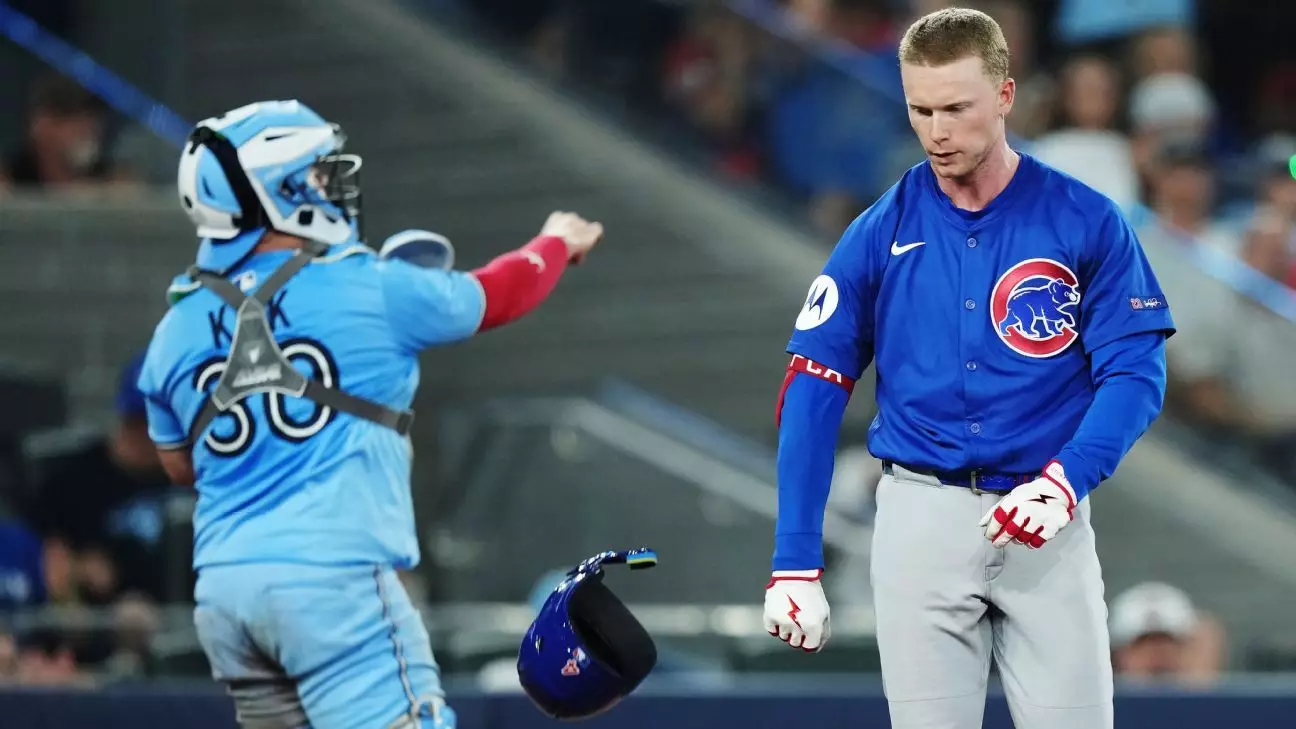The Chicago Cubs are currently facing an ominous slump, one that threatens their aspirations and tests their resilience. Yet, what stands out starkly is their collective insistence on trusting the process over obsessing over immediate results. This mindset, while admirable, requires a nuanced examination. How truly sustainable is a focus solely on process amid a challenging losing streak? Are the players and coaching staff genuinely embracing this mentality, or is it a guarded optimism masking deeper anxieties?
The Cubs have slid into a pattern of losing three consecutive series for the first time this season. Such streaks, although common in professional sports, serve as a stark reminder that no team is invincible. The pivotal moment in their recent game against the Blue Jays was a squandered opportunity in the eighth inning—a classic illustration of how momentum can slip through a team’s fingers. Despite having runners on second and third with no outs, they failed to push across the tying run, exemplifying the pressure and frustration mounting during this stretch.
The team’s approach, championed by manager Craig Counsell, emphasizes mental toughness and perseverance. His assertion that “things not going right is not what’s happening” reflects a belief that external circumstances are less important than internal resilience. However, such a stance can risk downplaying legitimate issues—namely, their dwindling offensive power and inconsistent production. A team that once dazzled offensively now ranks 28th in runs scored since the All-Star break, a significant decline that hints at deeper structural issues rather than mere bad luck.
Understanding the Struggle: A Multifaceted Offensive Dilemma
The problems plaguing the Cubs are multi-layered. They do not stem from a single player or isolated incident but from a collective decline in offensive productivity. Core contributors from the first half—such as Kyle Tucker, Seiya Suzuki, and Ian Happ—are all experiencing noteworthy downturns. Tucker, for example, has managed just a .195 batting average since July 1, with minimal power production. Suzuki’s RBIs have dwindled from a dominant first-half figure to a mere eight since the break, illustrating how even previously reliable hitters are struggling to maintain their rhythm.
Pete Crow-Armstrong’s slump epitomizes the mental toll of prolonged poor performance. His statistics—three hits and 15 strikeouts in August—highlight frustrations that can snowball without effective mental resilience. When players feel like they’re not contributing, a self-imposed pressure can hinder their ability to perform, creating a vicious cycle of underperformance and increasing stress.
From a strategic perspective, the Cubs must address whether their offensive decline is due to mechanical adjustments, pitch selection, or simply a lack of confidence. Coaches and players need to critically analyze what has changed since the first half. Have pitchers figured out their hitting tendencies? Are fatigue, injury, or complacency factors? A thorough, honest assessment is essential for crafting targeted solutions, rather than relying solely on the long-term belief in “sticking to the process.”
Harnessing Mental Toughness and Strategic Adaptation
While mental fortitude is vital, it must be coupled with strategic adjustments. The Cubs’ emphasis on resilience and process-oriented thinking can serve as a foundation, but actions must follow. For example, tweaking batting approaches—perhaps encouraging more aggressive swings or focusing on high-percentage pitches—could reinvigorate their stagnant offense.
Counsell’s advice on maintaining focus on the “things that get you results” resonates deeply, especially in a season where external pressure can cloud judgment. The team’s challenge is to balance patience with proactive adaptation. It’s not enough to hope that their offensive struggles resolve on their own; deliberate changes, whether in lineup configurations or approach at the plate, are necessary.
Additionally, cultivating a culture of accountability, where players openly discuss struggles and collaboratively seek solutions, can enhance the collective mental resilience. It’s imperative that the Cubs do not fall into a state of helplessness but view their predicament as an opportunity for growth and refinement.
The Path Forward: Seizing Opportunities Amid Adversity
Despite the current setbacks, the Cubs remain in a competitive position, especially with their streak of avoiding sweeps and maintaining a spot in the wild-card race. This resilience demonstrates that while struggles are evident, they are not insurmountable. The season is far from over, and teams have historically rebounded from similar slumps through strategic adjustments and renewed focus.
The looming division rivalry with the Milwaukee Brewers and the Cincinnati Reds presents both a challenge and an opportunity. Wins in these crucial matchups could serve as catalysts, reigniting confidence and morale. The players’ acknowledgment that “we’re the Cubbies” reflects a team that recognizes its identity and potential—attributes that can be harnessed in times of adversity.
Ultimately, the key to turning the season around lies in transforming focus from mere results to actionable improvements. Embracing resilience, analyzing the root causes of offensive struggles, and making data-driven adjustments will empower the Cubs to reclaim their earlier offensive prowess. Confidence can be rebuilt through small, consistent victories—both in execution on the field and in cultivating a mindset that refuses to accept defeat.
The window for redemption remains open, but it requires an unapologetic commitment to self-criticism, strategic re-evaluation, and unyielding belief in the process of growth. For the Chicago Cubs, this is the time to harness adversity not as a signal of decline but as a catalyst for a powerful resurgence.


Leave a Reply